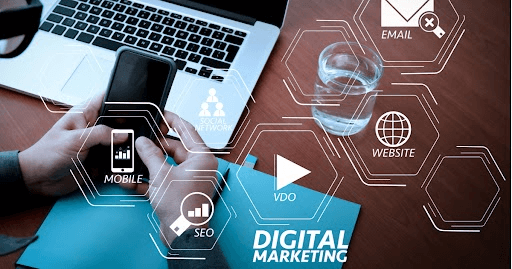Mobile app marketing is a marketing method that tries to interact with mobile app users throughout their user journey, from the moment they download and install the app on their device until the moment they become a loyal user of that app.
Mobile app marketing necessitates keeping your customers engaged across the marketing funnel, from discovering and installing your app to onboarding and interacting with it.
The following are some of the most notable advantages of mobile app marketing:
- Mobile apps always give you complete visibility. While users may not always have time to log in to their computers to check crucial messages and emails, they can do so on the road using a mobile device.
- Mobile apps are a convenient and effective way to increase client engagement and contact. They can keep users up to date on new product launches, special offers, and other relevant information, fostering direct contact.
- Mobile apps are great for fostering customer-brand relationships by sending out timely notifications, alerts, and reminders that encourage users to act.
- Customers' experiences and pleasure are enhanced by mobile applications, which allow them to interact with your business and even make purchases while on the go.
- Because smartphones are used by such a big percentage of the global population, mobile apps can significantly increase your customer base. As your consumer base expands, so does your brand's credibility.
New Marketing Channels for Mobile Devices
Mobile devices' growing capabilities enable new forms of interactive marketing. Among the new mobile marketing channels are:
- A location-based service (LBS) detects the user's current position (geolocation) and sends marketing messages to companies in that area.
- Augmented reality mobile ads overlay location-specific information about businesses and items on the user's phone display.
- 2D barcodes scan vertically as well as horizontally, allowing for far more information to be stored. Scanning barcodes in the environment allows a mobile user to access information connected with them.
- When a user enters range of a GPS device, he receives location-specific messages.
Methods for Increasing Conversions
Aside from having a mobile-friendly website or app, certain tactics are more likely to improve user experience while also increasing sales. We'll go over the four approaches to increase engagement and conversions in this part.
Micro-moments should be prioritized.
Users are increasingly turning to their mobile devices for immediate, on-the-spot guidance, assistance, or information. They are more prone to take immediate action and anticipate instantaneous responses than sitting down to investigate a topic or issue in depth.
To improve the user experience, employ QR codes.
QR codes are one approach to give essential information to mobile users as fast and seamlessly as feasible. QR codes should ideally work as shortcuts for getting useful information into the hands of your consumers and prospects, regardless of what you're utilizing them for.
Make use of hyperlocal advertising.
Consumers are relying on their cellphones for location-specific information more than ever before. Not just citywide data, but hyperlocal data based on extremely small, geographic regions as well (like neighborhoods or even specific streets).
Make use of SMS marketing.
Connect with users on the go with SMS marketing. Offering incentives, promoting discounts and events, sending appointment reminders, and publishing customer surveys are just a few examples.
Digital Marketing- Pay Per Click
PPC (pay-per-click) is an advertising technique in which marketers publish ads on a platform and pay the platform's host when their ad is clicked.
The ad's purpose is to direct users to the advertiser's website or app, where they may complete a valuable action like purchasing a product.
Advertisers may display ads related to what consumers are searching for on search engines, which makes them attractive host platforms.
How Paid Search Works?
An auction for the keyword takes place every time an ad slot on a search engine results page (SERP) becomes available.
The winner of the top spot is determined by a mix of variables, including the amount of the bid and the quality of the ad.
Keywords:
Keywords are at the heart of pay-per-click advertising, linking marketers with users' search queries.
- The actual terms that users type into a search engine's search box to retrieve results are known as queries.
- In contrast, marketers utilize keywords to target these consumers by matching their search queries.
Keywords serve as abstract representations of a wide range of search queries that are prone to errors such as misspellings.
Ads:
Ads are what users will see if the auction is won, therefore getting them right is crucial.
Headlines, descriptive lines, and a URL are usually included.
Ad extensions are beneficial since they boost ad visibility by making advertising more interesting for users while also delivering more information.
Budget and Bids:
Budgets are set at the campaign level and can be exceeded daily, but not on a monthly basis.
Budgets should be created in accordance with the account's overall plan, but bids are a more detailed approach of keeping track of spending.
Individual campaigns or a portfolio of campaigns can benefit from bid tactics.
AdRank:
Other elements are used by search engines when determining which advertising should appear at the top and most lucrative location on the SERP.
Other factors are factored in by search engines in their own unique methods to decide ad rank.
For example, Google considers:
- Amount of the bid.
- Ad quality and relevance
- The search's context (such as the user's device and the time of day).
- The influence of the format (e.g., whether it includes extensions that enhance the format of the ad).
Ad relevance is determined by Quality Score, which is a measure.
Targeting:
Advertisers can only show advertising to relevant consumers if they use the proper keywords.
However, there are alternative targeting possibilities for optimizing campaigns, such as:
- Device-specific targeting.
- Targeting based on location.
- Targeting by day and hour.
- Targeting specific demographics.
Bids for keywords can be modified automatically based on targeting options, providing advertisers greater control over traffic and spend by spending when clients are more important to the company.
Conversions:
To determine whether a PPC campaign is performing well and how many conversions may be attributed to sponsored search rather than other marketing channels, conversion tracking is critical.
Because conversion routes are more sophisticated than a simple click on an ad and a direct purchase, conversion tracking can be difficult.


